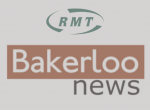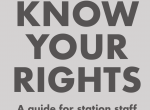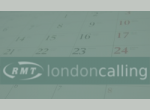RMT Stations Health & Safety reps have sent the following letter to Mike Strzelecki, London Underground's Director of Safety ...
“Based on assessment of all available information, and following several expert consultations, I have decided to raise the current level of influenza pandemic alert from phase 4 to 5. Influenza pandemics must be taken seriously because of their capacity to spread rapidly to every country in the world...All countries should immediately activate their pandemic preparedness plans. Countries should remain on high alert for unusual outbreaks of influenza-like illness and severe pneumonia” Statement by WHO Director-General, Dr Margaret Chan
Dear Mike,
This letter is addressed as much to Andy Barr (Network Co-ordinating manager), Howard Collins (COO) and Richard Parry (Interim MD) as it is to you.
This letter has also been prepared as a circular for staff to keep them abreast of latest developments on LUL regarding Influenza A (H1N1) or swine flu.
As you are aware, the Stations and Revenue Safety Council met yesterday with Dr. Olivia Carlton invited to update the Council on LUL’s advice and plans.
The meeting ended in a shambles with the Trade Union representatives (RMT/TSSA) adjourning to seek further advice from their Head Offices. Sadly, management were more pre-occupied with endeavouring to twist our adjournment into a walk-out (and thus threatening to dock our pay) rather than addressing the very serious issues raised. The management Chair of the Council even sought advice from Employee Relations. Paul Tullet from Employee Relations stated that we were not to adjourn because the matter was not serious or imminent.
We believe Paul Tullet to be improvident and the management team at best complacent with regard to this serious, imminent and fast developing matter.
The concerns we raised were manifold but can be immediately reduced to two inter-linked issues. Our approach is sensibly predicated on the basis that we “hope for the best but prepare for the worst”. Sadly, LUL’s response seems to be “bury your head in the sand”.
1) Emergency Preparedness Plans: We were told that LUL have plans ready to be signed off. In other words, a week on from the outbreak in Mexico and the spread of influenza A H1N1 (laboratory confirmed) to 9 countries (including the UK) and the WHO levels increasing from 3 to 4 and then on 29 April the Dr Margaret Chan (WHO Director General) declaring level 5 (imminent), LUL have failed to prepare a Plan let alone consult elected safety representatives.
We were eventually offered a TfL plan (old) and Briefing Note. The TfL Briefing note astonishingly states: “TfL has well developed and tested contingency plans that will keep the transport system operating in the event of a major outbreak”. Why would we want a ‘Plan’ to spread the virus in the event of an “outbreak”?
In the event of a pandemic the tube is a particularly unique institution given the sheer number of passengers we transport; the close proximity in which passengers and staff interact (take a trip during peak hours) and the extent of the network covering vast areas of the Capital and thus an important medium for the potential to spread the virus.
It is for this reason we requested (and continue to) a network-wide, all companies meeting with the trade unions to discuss our preparations, plans and implementation in the event of a full pandemic. Sadly, the response from management is that there will be no consultation on the plans and no meetings will be arranged until a Level 6 (Full Pandemic) is declared.
This is woefully inadequate if not irresponsible. Clearly lessons have not been learnt from 7 July 2005 when our staff were the first to deal with the emergencies declared that day but the last to find out what was actually going on.
Poor communications was highlighted as a particular concern and Tim O’Toole at the time stated “The big lesson for us is to invest in your staff, rely on them; invest in technology but do not rely on it”. Now, whether through some collective managerial amnesia or directive from the Cabinet Office Briefing Rooms, you are insisting staff remain in the dark.
Any Emergency Preparedness Plan should incorporate (as required by the Civil Contingencies Act 2004) an integrated approach that comprises of related activities. Emergency Preparedness: anticipation, assessment, prevention and preparation. Emergency Response and Recovery: self explanatory.
An integrated response and recovery relates to multi-agency structures and operations and is based on mutual trust and understanding. This is highly unlikely given you are unwilling to consult and discuss Plans within LUL.
We asked management on many occasions in the course of the meeting yesterday whether you believe staff (and by extension, the travelling public) are expendable. Not once did we receive a response that could equate to a negative i.e. that you do not see staff as expendable and that you will do everything in your power to ensure a robust emergency plan is in place.
2) PPE/Cleaners: We were told that surgical gel is on order for hand wash use. This is positive. However, when we asked as to when we could expect the surgical gel to arrive we were told possibly within 48 hours. The incredible slowness of management preparations is really quite astonishing.
We discussed various PPE options such as face masks and gloves and are more than willing to discuss further the effectiveness of these measures. Management must not be so quick to discard the effectiveness of such measures. Even the HSE (30 April) state on the use of face masks: “...there may be situations when it will be advisable for a worker to wear a mask. Such a situation will depend on the nature of the work and where it is carried out” The HSE guidance continues:
“Employers should carry out a risk assessment and, amongst other things, gauge: If workers are likely to encounter members of the public who are displaying symptoms; Where contact with people displaying symptoms is likely, whether any measures can be taken to minimise contact; The duration and frequency of contact with members of the public”.
General hygiene and cleanliness will be key in preventing the spread of the virus. We believe we need a far more robust review of the cleaning contracts, deployment of cleaners and cleaning materials. Indeed, it would be seriously worth considering bring cleaning back in-house. These are extraordinary times and that requires extraordinary measures.
We are not raising these issues to scaremonger or panic anyone. We believe that we need a far more robust approach to ensure the safety of our staff and that of the travelling public. The issues, as we said, are manifold. We are uniquely placed as operators of a mass transport system in either aiding the spread of the virus at greater speed and extent across the Capital or facilitating the isolation of the virus and saving lives.
That requires a serious and concerted effort on your part to come and talk to us and engage in meaningful consultation to prepare for the worst even if it is not realised.
A week has already been wasted. We’re ready to talk. Are you?
- 1894 reads






